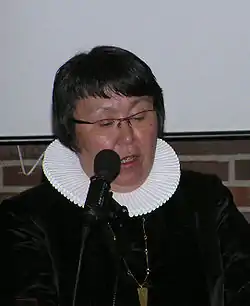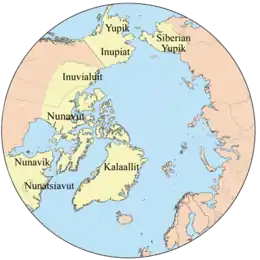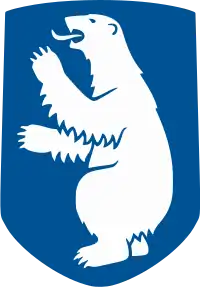Kalaallit
Kalaallit are a Greenlandic Inuit ethnic group, being the largest group in Greenland, concentrated in the west. It is also a contemporary term in the Greenlandic language for the indigenous of Greenland (Greenlandic Kalaallit Nunaat).[3] The Kalaallit (singular: Kalaaleq[4]) are a part of the Arctic Inuit. The language spoken by Inuit in Greenland is known as Kalaallisut, known in English as Greenlandic.
 Bishop Sofie Petersen, first Inuit Lutheran bishop | |
| Total population | |
|---|---|
| 57,777 (2023 est)[1] | |
| Regions with significant populations | |
| Greenland | |
| Languages | |
| Greenlandic (Kalaallisut) and Danish[1][2] | |
| Religion | |
| Inuit religion, Evangelical Lutheranism | |
| Related ethnic groups | |
| Greenlandic Inuit, Inuit |
Name
Probably adapted from the name Skræling,[5] Kalaallit historically referred specifically to Western Greenlanders. On the other hand, Northern and Eastern Greenlanders call themselves Inughuit and Tunumiit, respectively. About 80% to 88% of Greenland's population, or approximately 44,000 to 50,000 people identify as being Inuit.[6][7]
Regions
As 84% of Greenland's landmass is covered by the Greenland ice sheet, Kalaallit live in three regions: Polar, Eastern, and Western. In the 1850s some Canadian Inuit migrated to Greenland and joined the Polar Inuit communities.[8]
The Eastern Inuit, or Tunumiit, live in the area with the mildest climate, a territory called Ammassalik. Hunters can hunt marine mammals from kayaks throughout the year.[8]
The Northeast Greenland Inuit are now extinct. Douglas Clavering (1794–1827) met a group of twelve Inuit, including men, women and children, in Clavering Island in August 1823. There are many remains of former Inuit settlements in different locations of the now desolate area, but the population died out before mid-19th century.[9]
Art
The Kalaallit have a strong artistic tradition based on sewing animal skins and making masks. They are also known for an art form of figures called tupilaq, or "evil spirit object." Traditional art-making practices thrive in the Ammassalik.[6] Sperm whale ivory remains a valued medium for carving.[10]
Notes
- "Greenland". The World Factbook (2023 ed.). Central Intelligence Agency. Retrieved 2023-09-17.
- "Inuktitut, Greenlandic." Ethnologue. Retrieved 6 Aug 2012.
- Hessel, 8
- Store, P; Clarkson, Iain, eds. (1992). Language Contact across the North Atlantic: Proceedings of the Working. Darmstadt: De Gruyter. p. 135. ISBN 978-3-484-30359-1.
- Dorais, Louis-Jacques (2014). The Language of the Inuit: Syntax, Semantics, and Society in the Arctic. McGill-Queen's University Press. p. 139. ISBN 978-0-7735-8176-0.
Greenlandic kalaallit ("Greenlanders," probably from medieval Scandinavian skrællingar, "pagans, savages")
- Hessel, 20
- Baldacchino, Godfrey (2006). Extreme Tourism: Lessons from the World's Cold Water Islands. Elsevier. p. 101. ISBN 978-0-08-044656-1.
- Hessel, 11
- Clavering, Douglas Charles (1830). "Journal of a voyage to Spitzbergen and the east coast of Greenland, in His Majesty's ship Griper". Edinburgh New Philosophical Journal. 9: 21–24.
- Hessel, 21
References
- Hessel, Ingo. Arctic Spirit. Vancouver: Douglas and McIntyre, 2006 ISBN 978-1-55365-189-5
External links
- Kalaallit historical art collections, National Museum of the American Indian
- Kalaallit archaeology art collections, National Museum of the American Indian

